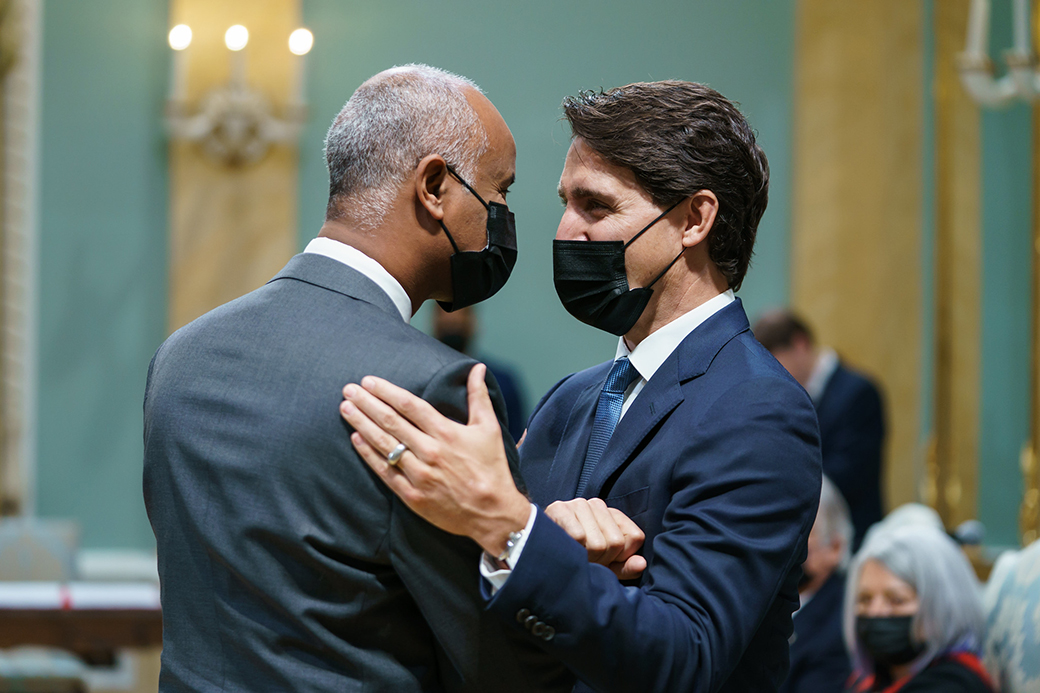The appointment of Ahmed Hussen as Minister of Housing, Diversity and Inclusion gives us hope in the federal government’s aspiration to make a difference. But what exactly does that mean? Stakeholders involved in the community-housing sector, including the Centre’s executive director, Stéphan Corriveau, and independent consultant Steve Pomeroy reflect on the implications of the change.
Dear readers,
When the work of Justin Trudeau’s new government began Nov. 22, the appointment of a minister dedicated to housing was an important development.
This is not the first time the government of Canada has appointed a housing minister, but the last was a long ago. The move shows a willingness to bring this issue, which affects so many people, to the forefront.
The Centre was pleased that Ahmed Hussen will be able to devote even more energy to housing issues in his new position in the Trudeau cabinet.
Minister Hussen has already been responsible for housing since 2019, but as part of his role as minister of Families, Children and Social Development. So he already had knowledge of the sector (both professional and personal, since the minister lived in social housing after arriving in Canada as a Somali refugee), and his experience will enable him to hit the ground running.
But, concretely, what does it mean that a minister be specifically assigned to housing issues?
For the Centre’s executive director, Stéphan Corriveau, the appointment is a public affirmation that the federal government takes housing seriously.
For Corriveau, it also means that the community housing movement must “continue and expand its collaboration with the minister” to advocate for sustainable solutions for the community-housing sector and the stabilization of affordable rental housing stock—in addition to measures that promote overall housing affordability.
For the Canadian Alliance to End Homelessness, the Co-operative Housing Federation of Canada, the Canadian Lived Experience Leadership Network and the Canadian Housing and Renewal Association (the four organizations behind the Vote Housing campaign), Hussen’s appointment gave hope to Canadians who want more action on affordable housing and an end to homelessness.
United voices
The heads of these organizations (Tim Richter, Tim Ross, Al Wiebe and Jeff Morrison, respectively) have issued a joint statement in which they say they see good news now that Hussen will be able to focus his energy on housing.
They also highlight the fact that housing is linked to diversity and inclusion issues within the same ministry. This, they say, is “reflective of who the housing crisis is hurting the most and a promising signal of how this federal government may target its housing investments.”
We also sought the views of Steve Pomeroy (an independent consultant and well-known expert in housing policy and strategy research) on the creation of the Ministry of Housing, Diversity and Inclusion. Even as supporters of the move, it is important for us to consider it from an outside perspective.
For Pomeroy, the fact that housing is now supported by Infrastructure Canada (instead of Employment and Social Development Canada, as before) is noteworthy. “I think it could actually be quite powerful,” he says. “That sort of sends a pretty strong signal that the government is actually more interested in how it can integrate housing issues with urban issues.”
On the other hand, the appointment of Ahmed Hussen “is a bit of a mixed message,” he says. “On the one hand, yes, the government has actually given an acknowledgement that it sees housing as an important area, and it wants to basically pursue an agenda. But at the end, the implementation of that and the ability of that minister to carry out that mandate, will he actually have a strong enough voice in cabinet?”
In other words, we will have to see what Hussen can do with a small portfolio when he does not have the same influence as other, more established, ministers.
Pomeroy advises that it would be important for Hussen to build relationships within cabinet, particularly with the finance minister. “Because, at the end of the day, that’s the ministry that makes all the big decisions.”
As well, the housing policy expert suggests that it will be important for housing advocacy groups to not only target Hussen with their requests, but other ministers as well. They, too, need to understand the issues.
Finally, Pomeroy reminds us that, for many years Ottawa has been “long, long, long, long on talk and short on action. And I think this minister needs to basically get on the bus and start moving things along.”
One of the things that needs to be done quickly is to finally appoint the federal Housing Advocate, says Corriveau. Two years after its creation, the position has yet to be filled. As well, “it is high time there was a specific strategy for Indigenous people, especially those in urban, rural and northern areas.”
Housing highlights in Throne Speech
The mandate letter, which outlines what Minister Hussen will have to accomplish, has not yet been published, and we look forward to reading it.
However, the Speech from the Throne, delivered by Governor General Mary Simon on Nov. 23, entitled Building a Resilient Economy: A Cleaner, Healthier Future for Our Children, states that “the government’s plan [to continue to fight the rising cost of living] includes two major priorities: housing and child care.”
It talks about “building more units per year, increasing affordable housing, [and] ending chronic homelessness” The government is also “committed to working with its partners to get real results.”
This gives us hope that the coming year will bring greater action on ensuring the right to housing in Canada.
Have a delightful December.
This editorial appears in the InfoCentre newsletter. To subscribe to our monthly newsletter, click here.



